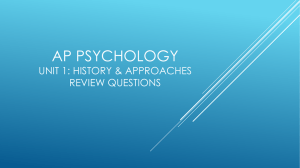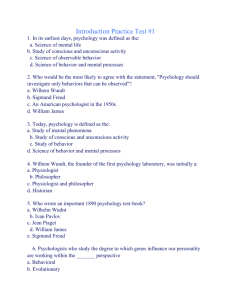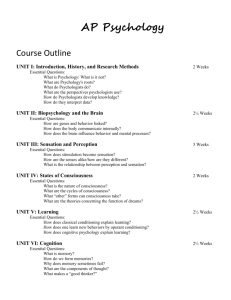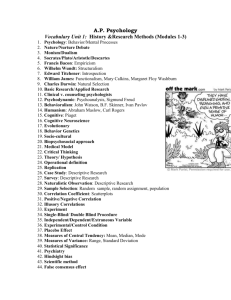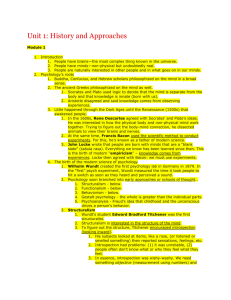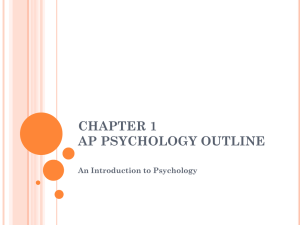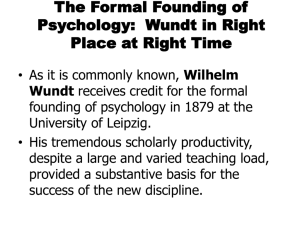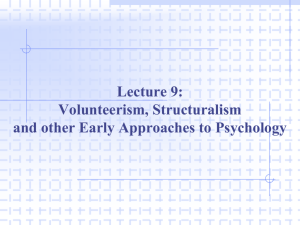MyMajor
advertisement
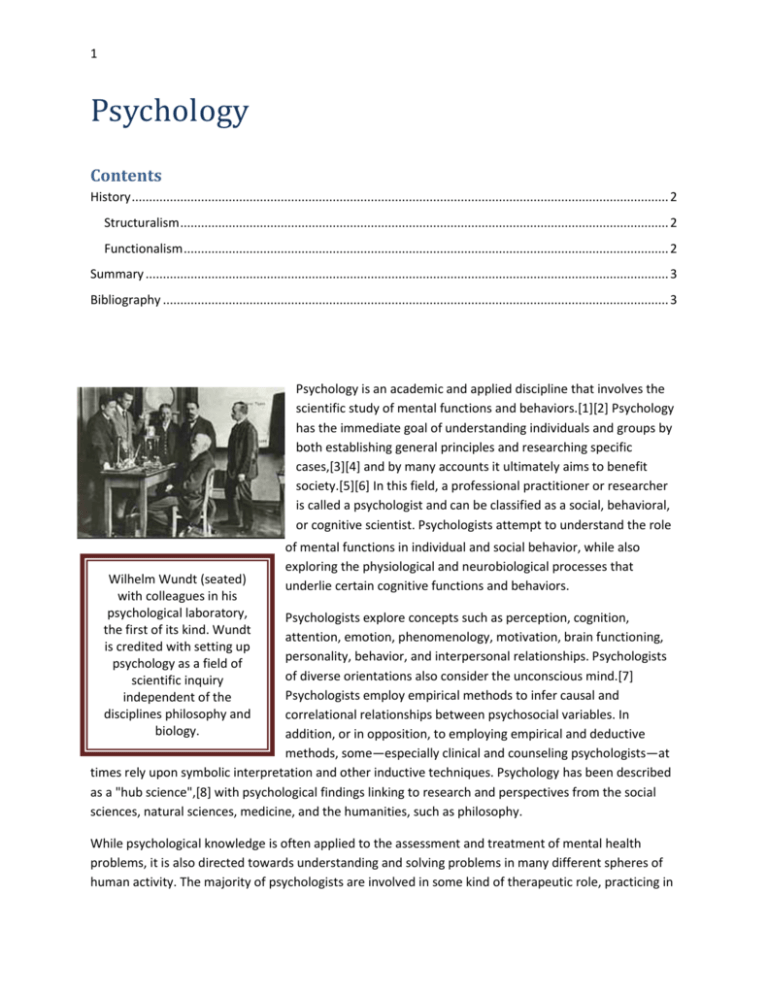
1 Psychology Contents History ........................................................................................................................................................... 2 Structuralism ............................................................................................................................................. 2 Functionalism ............................................................................................................................................ 2 Summary ....................................................................................................................................................... 3 Bibliography .................................................................................................................................................. 3 Psychology is an academic and applied discipline that involves the scientific study of mental functions and behaviors.[1][2] Psychology has the immediate goal of understanding individuals and groups by both establishing general principles and researching specific cases,[3][4] and by many accounts it ultimately aims to benefit society.[5][6] In this field, a professional practitioner or researcher is called a psychologist and can be classified as a social, behavioral, or cognitive scientist. Psychologists attempt to understand the role Wilhelm Wundt (seated) with colleagues in his psychological laboratory, the first of its kind. Wundt is credited with setting up psychology as a field of scientific inquiry independent of the disciplines philosophy and biology. of mental functions in individual and social behavior, while also exploring the physiological and neurobiological processes that underlie certain cognitive functions and behaviors. Psychologists explore concepts such as perception, cognition, attention, emotion, phenomenology, motivation, brain functioning, personality, behavior, and interpersonal relationships. Psychologists of diverse orientations also consider the unconscious mind.[7] Psychologists employ empirical methods to infer causal and correlational relationships between psychosocial variables. In addition, or in opposition, to employing empirical and deductive methods, some—especially clinical and counseling psychologists—at times rely upon symbolic interpretation and other inductive techniques. Psychology has been described as a "hub science",[8] with psychological findings linking to research and perspectives from the social sciences, natural sciences, medicine, and the humanities, such as philosophy. While psychological knowledge is often applied to the assessment and treatment of mental health problems, it is also directed towards understanding and solving problems in many different spheres of human activity. The majority of psychologists are involved in some kind of therapeutic role, practicing in 2 clinical, counseling, or school settings. Many do scientific research on a wide range of topics related to mental processes and behavior, and typically work in university psychology departments or teach in other academic settings (e.g., medical schools, hospitals). Some are employed in industrial and organizational settings, or in other areas[9] such as human development and aging, sports, health, and the media, as well as in forensic investigation and other aspects of law. History The study of psychology in a philosophical context dates back to the ancient civilizations of Egypt, Greece, China, India, and Persia. Historians point to the writings of ancient Greek philosophers, such as Thales, Plato, and Aristotle (especially in his De Anima treatise),[13] as the first significant body of work in the West to be rich in psychological thought.[14] As early as the 4th century BC, Greek physician Hippocrates theorized that mental disorders were of a physical, rather than divine, nature.[15] Structuralism German physician Wilhelm Wundt is credited with introducing psychological discovery into a laboratory setting. Known as the "father of experimental psychology",[16] he founded the first psychological laboratory, at Leipzig University, in 1879.[16] Wundt focused on breaking down mental processes into the most basic components, motivated in part by an analogy to recent advances in chemistry, and its successful investigation of the elements and structure of material. Although Wundt, himself, was not a structuralist, his student Edward Titchener, a major figure in early American psychology, was a structuralist thinker opposed to functionalist approaches. Functionalism Functionalism formed as a reaction to the theories of the structuralist school of thought and was heavily influenced by the work of the American philosopher, scientist, and psychologist William James. James felt that psychology should have practical value, and that psychologists should find out how the mind can function to a person's benefit. In his book, Principles of Psychology,[17] published in 1890, he laid the foundations for many of the questions that psychologists would explore for years to come. Other major functionalist thinkers included John Dewey and Harvey Carr. Other 19th-century contributors to the field include the German psychologist Hermann Ebbinghaus, a pioneer in the experimental study of memory, who developed quantitative models of learning and forgetting at the University of Berlin,[18] and the Russian-Soviet Skinner's teaching machine, a mechanical invention to automate the task of programmed instruction. 3 physiologist Ivan Pavlov, who discovered in dogs a learning process that was later termed "classical conditioning" and applied to human beings.[19] Starting in the 1950s, the experimental techniques developed by Wundt, James, Ebbinghaus, and others re-emerged as experimental psychology became increasingly cognitivist—concerned with information and its processing—and, eventually, constituted a part of the wider cognitive science.[20] In its early years, this development was seen as a "revolution,"[20] as cognitive science both responded to and reacted against then-popular theories, including psychoanalytic and behaviorist theories. Summary History o Structuralism o Functinalism Bibliography World, C. o. (2012, January 27). wikipedia.org. Retrieved January 23, 2014, from Wikipedia: http://www.wikipedia.org


